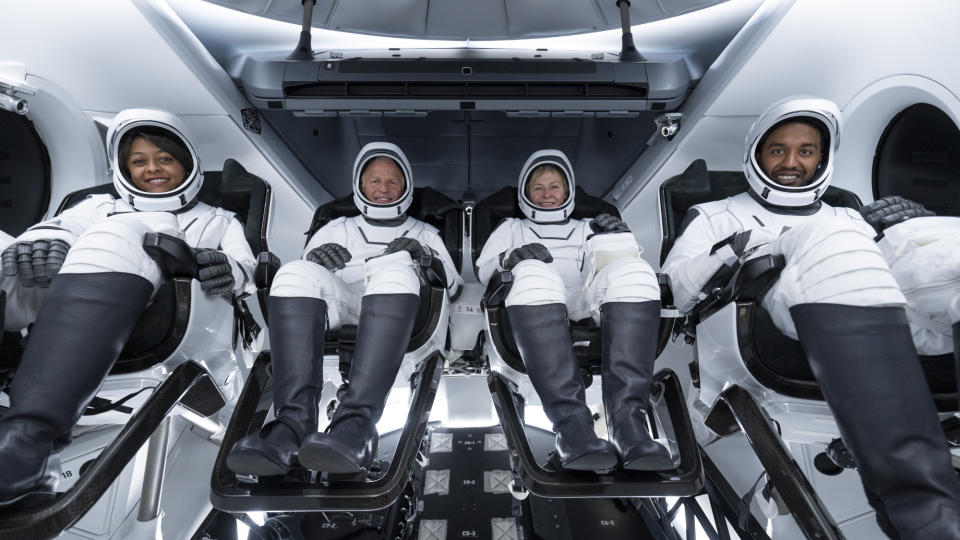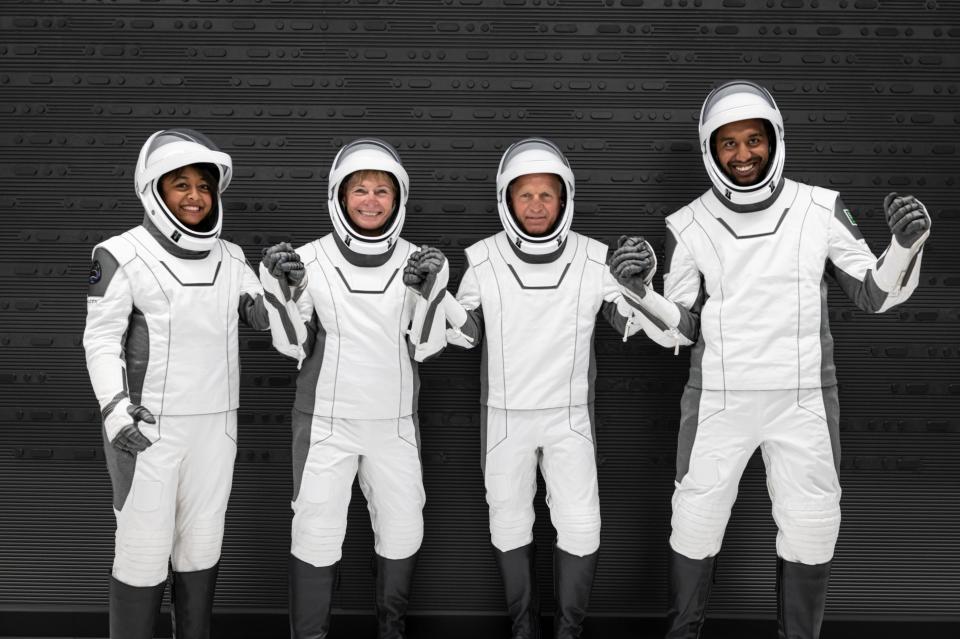SpaceX rocket 'go' to launch four private astronauts on Ax-2, a mission filled with 1sts, today

Update for 6:19 pm ET: SpaceX has successfully launched the private Ax-2 astronaut mission to the International Space Station. Read our launch wrap story and see video and photos.
Axiom Space is ready to launch its second-ever private mission to the International Space Station today (May 21), a flight that will mark a series of spaceflight firsts.
The 10-day Ax-2 mission to the International Space Station has been cleared for launch, representatives from Axiom Space, NASA and SpaceX said Saturday (May 20) after completing one final launch readiness review. Liftoff is set for 5:37 p.m. (2137 GMT) on a SpaceX Falcon 9 rocket and Dragon capsule, which will launch from Pad 39A of NASA's Kennedy Space Center in Cape Canaveral, Florida.
"It's obviously a very, very exciting day," Derek Hassmann, Axiom Space chief of mission integration and operations, told reporters in a teleconference this evening. "We worked a long, long time in collaboration with our partners at SpaceX and NASA to get to this point. The crew has been working very hard to get trained and they're certainly ready to go."
Related: Live updates from the Ax-2 private astronaut mission
More: How to watch the Ax-2 mission's launch live online

The mission will be a historic one; not only will it be the second-ever all-private mission to the station, but it will also put the first woman from Saudi Arabia in space — Rayyanah Barnawi — as part of the nation's first astronaut class. Commanding the mission is Peggy Whitson, a former NASA astronaut who was the agency's first female Chief Astronaut and first female commander of the space station. Now, she'll be the first woman to command a private spaceflight.
"Oh, let me tell you we are a little excited about this and the fact that we are going to space shortly," Whitson told reporters in a teleconference May 16.
You can watch the Ax-2 launch live online on Space.com, courtesy of SpaceX and NASA. SpaceX's launch webcast will begin at 2 p.m. EDT (1800 GMT), while NASA's livestream will begin at 4:30 p.m. EDT (2030 GMT).
There is a 60% chance of good weather at launch time, Space Force weather officials said. But that weather forecast dwindles down to just a 20% chance of good weather of SpaceX has to delay 24 hours to Monday, May 22. SpaceX has only two days to try to launch Ax-2 this week before standing down to make way for a planned cargo mission for NASA on June 3 and Boeing's planned launch of the first Starliner crewed flight to the station in July, NASA has said.
One final rocket check
Benji Reed, SpaceX's senior director for human spaceflight programs, said that a final check of the mission's Dragon capsule Freedom did reveal one issue that needed to be resolved. Nine fasteners on a panel near the top of Dragon spacecraft had less thermal protection filler material than expected, Reed explained, so a team is using a crane near the rocket to reach the site to fill the gaps in those fasteners in time for flight.
"We're actually fairly confident that that would be okay that we could we could fly the dragon that way and then come back and reenter with the amount of fill that we have there. Those analyses are ongoing," Reed said. "However, in an abundance of caution, we've decided to go ahead and get those cells exactly to the amount that they need to be filled with this thermal protective protection material on those nine fasteners."
Reed said the process will be completed tonight.
"It'll have no impact, we expect, to the launch," Reed said.
SpaceX is using its Dragon capsule Freedom to fly the Ax-2 mission. It previously flew the Crew-4 astronaut mission to the space station for NASA last year. The Falcon 9 rocket on this flight appears to be new, but will return to Earth about nine minutes after launch to land at SpaceX's Landing Zone 1 at the nearby Cape Canaveral Space Force Station.
A crew ready to fly
The Ax-2 crew represents a diverse field of astronauts. Serving as commander is Whitson, who currently holds records for spending more time in space (665 days) than any other woman or American.
Alongside Whitson will be pilot John Shoffner, an experienced aviator and ham radio enthusiast. Shoffner is paying his way for the spaceflight experience under an agreement with Axiom Space.
"I feel like I've been preparing for this my entire life. I've been a fan of space since I was a child," Shoffner said on May 16. "I grew up in the age of the early space race, so getting here now and having a chance to fulfill that excitement is very, very powerful to me."

Whitson and Shoffner will be joined by Saudi astronauts Barnawi and Ali Alqarni, representing the first astronaut class of the Kingdom of Saudi Arabia.
"We are really honored and privileged to have you guys and to be part of this amazing mission," Alqarni said in the May 16 briefing last week, adding that he and Barnawi "are really thrilled and excited for our mission and to represent Saudi Arabia on this journey."
Barnawi added that she felt honored to become the first Saudi woman to fly in space on the mission.
"I am very honored and and happy to be representing all the dreams and and all the hopes of all the people in Saudi Arabia and all the women back home," she told reporters on May 16.
"May 21st, 2023, the Saudi flag will land amongst the stars," Barnawi wrote in a Twitter post.

The four Ax-2 crewmembers will spend a little over a week aboard the ISS, conducting more than 20 groundbreaking scientific experiments including one that will test how microgravity affects stem cell growth. In addition to science, the crew will engage in public outreach to promote science, technology, engineering and math (STEM) for children worldwide. "
We're very excited for the part that will be engaging with kids from all over Saudi Arabia and all over the world, talking about our experiments, talking about space and having them trigger their curiosity towards space," Barnawi said.
As suggested by its name, Ax-2 is the second mission that Houston, Texas-based Axiom Space has flown to the ISS atop SpaceX hardware. Its first mission, Ax-1, saw four private astronauts spend over two weeks in microgravity on the orbiting laboratory in what was the first all-private mission to the station.
RELATED STORIES:
— Meet the 4 astronauts of SpaceX's Ax-2 mission for Axiom Space
— Ax-2 private astronauts can't wait for their May 21 SpaceX launch to the space station
— Building a private space station: Q&A with Axiom Space CTO Matt Ondler
Axiom has already signed an agreement with NASA for a third mission, Ax-3, targeted for no earlier than 2023. Axiom Space also intends to build a commercial space station in low Earth orbit to help continue research and technology development in space following the impending retirement of the ISS.
In training and launching these private missions, Axiom Space hopes to "provide universal access to low Earth orbit so that innovators, governments and individuals can do the same," according to its website. The company boasts a roster made up of former NASA astronauts and program managers alongside aerospace industry luminaries.
Editor's note: You can watch SpaceX's Ax-2 private astronaut launch live on Space.com on Sunday, May 21, at 5:37 p.m. EDT (2127 GMT). Space.com Editor-in-Chief Tariq Malik contributed to this report.


